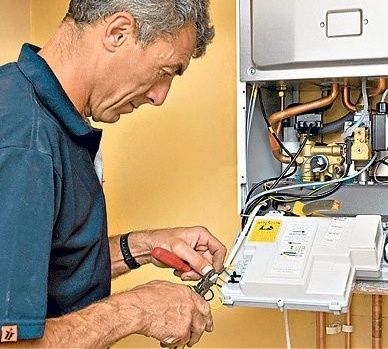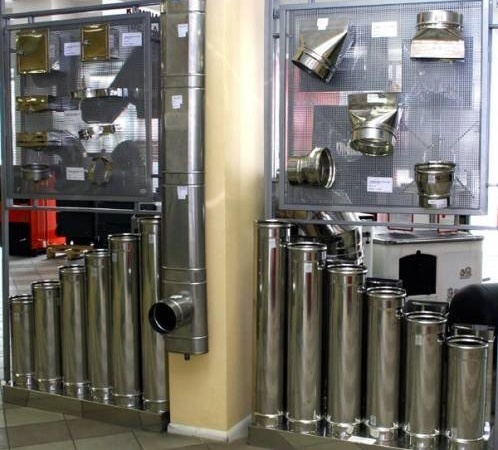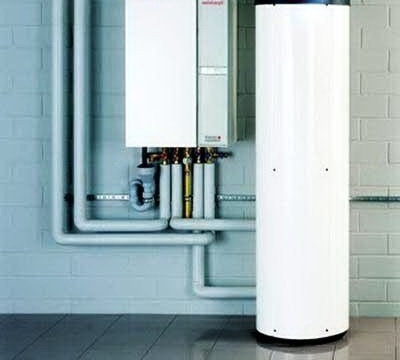Choosing a UPS for a gas boiler: how to find a high-quality uninterrupted power supply?
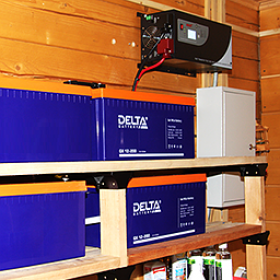
Modern autonomous heating systems for a private house are almost always equipped with a circulation pump and a control unit that works from the electric network. This moment creates a certain vulnerability for the whole house. If for some reason electricity is not supplied, the circulation pump is switched off, and this leads to a complete stop of the heating system. A very useful device will help solve the problem - an uninterruptible power supply or UPS for gas boilers. When choosing a suitable device, you should consider a number of important points.
Content
What is an uninterruptible in a boiler room for?
Uninterruptible power supplies are necessary not only to provide the heating system with electricity, but also to improve the quality of electricity supplied to a gas boiler. Electricity for a modern gas boiler is necessary both for the circulation pump and for other elements of the system, for example, for a control unit equipped with a microprocessor. This technique is usually sensitive to voltage drops in the network, with sudden surges, the processor can simply break.
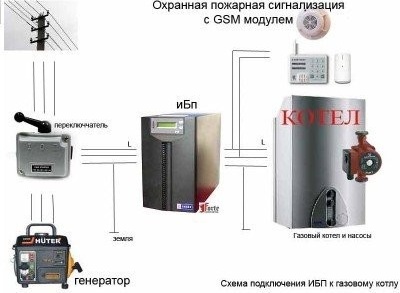
The UPS connection diagram shows which elements of the heating and energy systems of the house can be brought to backup power
Modern uninterruptible power supplies for a gas boiler can provide the output voltage of the mains in the form of a sinusoid. This current is necessary for the normal operation of electromagnetic valves, motors, pumps, processors, transformers and other controls of the heating system.
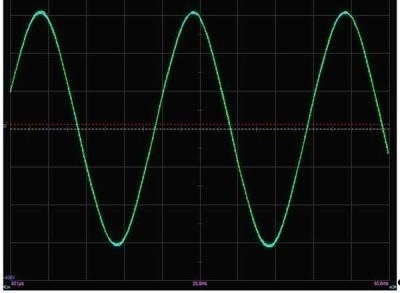
For correct operation of the circulation pump of the gas boiler, the current must be supplied through a sinusoid. A UPS designed for PC does not give out such current, which can lead to equipment breakdowns
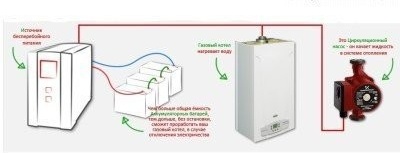
This figure schematically depicts the operation of an uninterruptible power supply, which provides electricity to the circulation pump of the gas boiler and other elements of the heating system
Do not use an uninterruptible power supply with a gas boiler, designed for computer equipment. Such a UPS is usually designed for 10-15 minutes of battery life. This is enough to safely complete the work of a stationary computer, but for a gas boiler, the period is too short. In addition, for the operation of electronic devices, such an indicator as “phasing” is important. It must correspond to the profile of the electrical network, which is possible only with the use of a special UPS.
The backup power source is designed quite simply: a power supply and a battery (or several batteries). Usually use a 12 volt battery.When the device is plugged in, the batteries are charged through the built-in charger, which converts the alternating mains current to 12V batteries needed. In parallel, 220V electricity is supplied directly to the gas boiler and other equipment. When the batteries are fully charged, the charger is turned off and only regular power is supplied to the system.
When a power outage occurs, the UPS automatically converts the current of 12-volt batteries to 220V and supplies it to the heating equipment until the power supply is restored or until the battery runs out of charge. When the electricity reappears in the network, the UPS operation mode automatically changes: the gas boiler again receives power from the 220V network, and the charger restores the full charge of the battery. Switching of operating modes takes place in a split second, so the operation of electrical equipment practically does not stop.
Types of backup power supplies
Modern UPSs that are suitable for a heating boiler can be divided into three main types:
- Off-line (off-line) models characterized by simplicity of design and low price;
- Line Interactive devices that provide greater protection for equipment and are in the middle price category;
- On-line (on-line) models, the most expensive and safest.
Offline uninterruptibles work simply. In the settings of the device, the boundary indicators of the permissible voltage in the network are fixed, usually they are 170-270V. If the mains voltage is outside these limits, the device automatically switches the power to the battery. As soon as the voltage in the network reaches the set indicators, there is a reverse switch to mains power. For the consumer, switching is seamless, since the disconnect-connection time from / to the battery is only 15 ms. In addition to batteries, this type of device also includes an inventory that converts battery energy into 220-volt current, as well as a voltage controller for the electrical network.
Off-line UPS does not provide a voltage stabilizer, which significantly impairs the operation of the device. Power surges occur in the domestic network quite often, especially in winter. The result is frequent switching of power to the battery and vice versa. Such an operation system leads to rapid deterioration of the batteries or the entire UPS.
Note! As practice has shown, uninterruptible off-line types do not always work correctly in combination with diesel or gasoline generators.
The device of line-interactive UPS differs from offline models by the presence of a voltage stabilizer. Here, boundary indicators of permissible voltage are also set in the range of 170-270V. Switching from / to the battery takes place automatically, but thanks to the stabilizer, all equipment is less at risk due to sudden voltage drops. When using linear-interactive uninterruptible power generators with liquid fuel generators, problems are also often observed.
Online UPS models work in a slightly different way. They have a double conversion inventory. The AC voltage arriving at the device is first converted to direct current, and then converted again to alternating current with stable performance. In this way, maximum protection of the equipment supplied to the UPS against voltage surges is achieved, since the equipment receives power only through the UPS. Arranging such an uninterrupted power supply is quite difficult, therefore its cost is always higher than that of the two previous types of UPS.
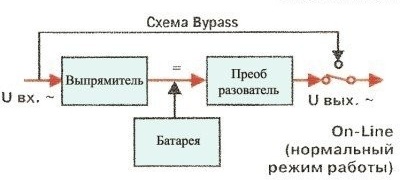
The diagram illustrates the principles of the on-line model of uninterruptible power supply for a gas boiler, in which electricity is supplied through a double conversion inventory
Please note that online UPSs with generator sets work almost flawlessly. It is such equipment that should be used by owners of mini-power plants.
How to choose the right UPS?
Not all owners of private houses can afford an expensive model of online uninterruptible power supply. Sometimes it makes sense to choose a device simpler and cheaper. To understand what type of UPS is needed for a particular house and how many batteries are needed, the following parameters should be evaluated:
- the quantity and power of equipment that will be powered by the UPS: gas boiler, additional pumps, alarm system, household appliances, etc.
- the quality of electricity entering the house from a centralized network or from a mini-power station;
- the probability of power surges, their range and frequency;
- the estimated power of the equipment connected to the UPS at the time of start-up;
- Estimated battery life of equipment powered by an uninterruptible power supply.
Be sure to consider the size of the induction loads. At the time of starting the circulation pump motor, a 3-6-fold increase in electric current can be observed. Usually in modern UPS models a certain margin of safety is made, but it still makes sense to increase the calculated power indicators when choosing an uninterruptible power supply by 20-30%.
Approximately 80% of the cost of an uninterruptible power supply are batteries. It is very important to accurately calculate the power of the equipment and the battery life so as not to overpay for unnecessary batteries. Owners of private homes are more likely to prefer inexpensive line-interactive or off-line UPS models. However, when using generator sets, mini-power plants or other similar equipment, it is more reasonable to purchase an online uninterruptible system to prevent damage to expensive equipment.
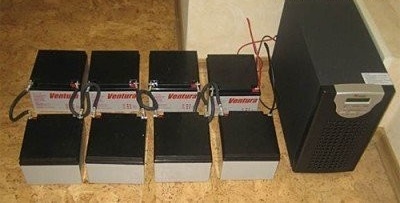
It is better to purchase a UPS with the ability to connect additional batteries so that you can increase battery life without replacing equipment
Interesting information about choosing a UPS for a gas boiler is presented in the following video:
Battery capacity and battery life
When choosing a UPS, you should check whether there is a possibility in the specific model for connecting additional batteries. If the operating conditions change, it will be possible to simply purchase and connect the required number of batteries, and not replace the entire uninterruptible power supply. Typically, built-in batteries are rated at 20 A / hours. This volume is not always enough.
It is also necessary to monitor the ratio of the charger current to the battery capacity. The ratio of these indicators should be 1:10. This means that for a battery with a five-ampere charge, you need a rechargeable battery with a capacity of 50 A / hours.
To determine the battery life of a gas boiler, you can use the following table:
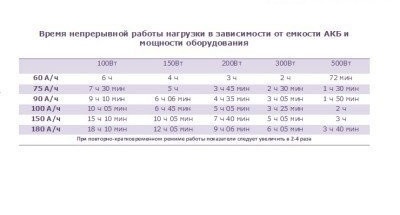
From this table, you can determine the approximate time of continuous operation of the gas boiler and other equipment depending on the load and battery capacity
This data is quite enough for household calculations. If more accurate indicators are needed, you should use special tables or order calculations from an electrical engineer. The above information allows you to determine the operating time of the equipment depending on its power and battery capacity with an error of about 30 minutes. Usually a 25-watt gas boiler has only one built-in circulation pump. Given the power of the electronic control unit, such a model can consume 90-150 watts of electricity. The UPS power for such a boiler should be about 300 watts.
According to the table below, a 150 Ah battery can provide autonomous power to a small boiler for about 10 hours.This is a fairly powerful battery, but if such a long period of operation of the boiler is not relevant, it makes sense to choose a smaller battery.
